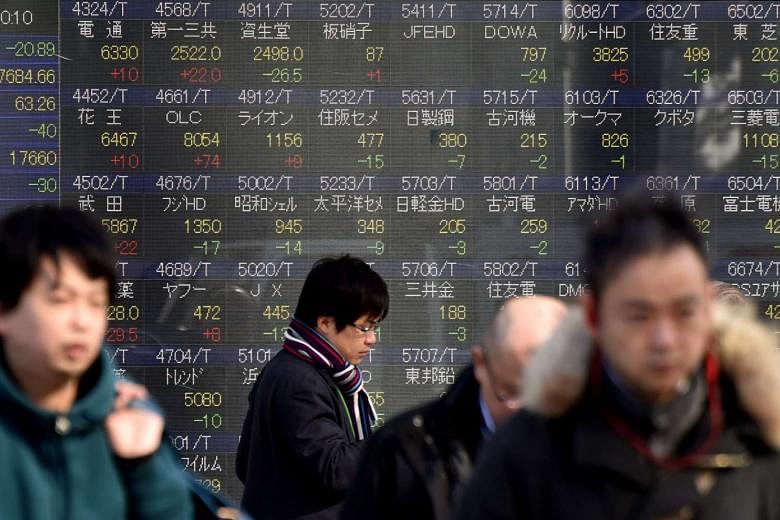WELLINGTON/SINGAPORE (BLOOMBERG) - Oil's sell-off reverberated through Asian markets for a second day on Wednesday (Feb 3), scuttling stocks and high-yielding currencies as anxiety over what the energy slump says about the health of the global economy saw investors seek out government debt.
Every major benchmark equity index in Asia retreated, while Standard & Poor's 500 Index futures signaled a third day of losses in American shares.
The MSCI Asia Pacific Index was down 2.3 per cent as of 10:36 am Hong Kong time. Nomura, which reported a 49 per cent drop in third-quarter profit, was among the biggest drags on the regional index and helped send the Topix to a 3.3 per cent slump. The Hang Seng China Enterprises Index of mainland companies in Hong Kong sank 3 per cent, despite a move by the central bank late Tuesday to prop up the Chinese real estate sector.
Singapore's Straits Times Index was down 1.63 per cent at 2,537.21 as of 11:01 am.
Futures on the S&P 500 declined 0.6 per cent, while Australia's benchmark equity gauge slumped 2 per cent and Korea's Kospi slipped 1.2 per cent.
US crude's 44 per cent retreat over the past year has weighed on growth in oil-rich emerging economies, fueled speculation of defaults by commodity producers and battered profits at corporate giants from BP to Exxon Mobil. In the latest sign that business conditions are deteriorating beyond the commodities industry, Nomura postponed a target for making its overseas operations profitable.
The rout in Japanese stocks has undone almost all of the gains from the Bank of Japan's surprise move to cut interest rates below zero on Friday.
"The underlying fundamentals are deteriorating," said Chris Weston, the chief market strategist at IG Ltd. in Melbourne. "How much more can central banks do from here?"
Malaysia's ringgit led declines among Asian currencies with the Korean won, while the New Zealand dollar rallied after the central bank chief signalled he's in no rush to cut interest rates further.
Oil has obliterated last week's rebound as energy analysts predict another round of stockpile gains amid simmering concern over the supply glut and a lack of willingness by major oil producers to address it.
Anxiety that the drop in oil and wider turmoil across financial markets will impact world growth is taking root, with an indexrun by Citigroup indicating data in Group of 10 economies is falling short of estimates by the most since May 2013. Exxon Mobil reported its biggest earnings decline in more than a decade on Tuesday, after BP posted a 91 per cent slump in its own quarterly profit.
A measure of service-industry growth in China, the epicentre of investors' concerns at the start of the year, is due on Wednesday, and Thailand is expected to keep its benchmark interest rates on hold. The Bank of Japan, which surprised markets with a stimulus boost last week, saw no need to ease policy at the end of last year, December meeting minutes showed.
"Since the BOJ cut last week, markets have been on edge, concerned that the global situation is considerably worse than initially envisaged and that global central bank's will be unable to combat deflationary risks driven by plummeting oil prices," Mr Mark Smith, a senior economist in Auckland at ANZ Bank New Zealand, said in a client note.

